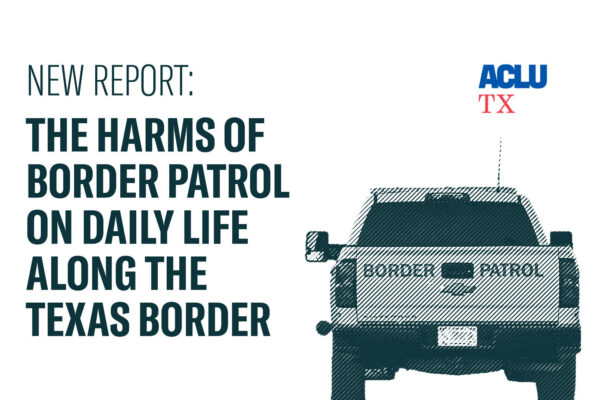BROWNSVILLE, Texas — The American Civil Liberties Union of Texas published a report today (en español) that shows how heavy Border Patrol presence threatens feelings of safety, independence, and an ability to maintain personal relationships along the southern border.
The survey titled “The Harms of Border Patrol on Daily Life Along the Texas Border” shows the results of 152 interviews with residents in the Rio Grande Valley, from September 2021 to May 2022 about their encounters with Border Patrol. Thirty-four percent of interviewees were U.S. citizens, 28% preferred not to disclose their immigrant status, and 22% had resident status such as a green card.
The results were alarming across the board, with 61% of interviewees saying they avoided going to essential locations like grocery stores, hospitals, polling places, and community centers due to a fear of encountering Border Patrol. Some 39% of interviewees said that an encounter with Border Patrol interrupted or impeded their daily routines, and 83% of interviewees said it affected their mental health.
“Border communities shouldn’t live in perpetual fear of Border Patrol violating their rights as they care for their children, go to work, and visit the doctor,”said Maria Cordero, policy and advocacy strategist at the ACLU of Texas. “When Border Patrol agents stake out school buses, use flimsy excuses to pull over drivers, and create a culture of fear so pervasive that even domestic abuse victims are afraid to call police, their presence actually makes our border feel less safe.”
Altogether Border Patrol upends daily life along the border, according to interviewees. Fear of harassment limits residents’ access to essential locations and key services while Border Patrol's heavy presence leads to traffic stops without cause.
Some of the key findings and illustrative encounters include:
- Border Patrol’s presence is a barrier to essential medical and social services. Thirty-four percent of people interviewed avoided seeking medical care due to Border Patrol, and 91 interviewees reported Border Patrol sightings in hospitals. About 55% of interviewees reported that they did not reach out to local police to report a crime due to concerns that the police would call Border Patrol agents to the scene.
- For domestic violence survivors, this fear of police means staying in dangerous situations. One survivor told us: “I was scared to call the police in my past situation of domestic violence. I lived many years in that situation.” The entanglement between the two law enforcement bodies contributes to distrust of local police.
- Sixty-one percent of respondents said they avoided going to essential locations, such as public parks, schools, or grocery stores, as a result of Border Patrol’s presence.
- On the road, more Border Patrol agents mean more traffic stops. People reported being stopped because they “looked suspicious” or other minor/nonexistent reasons.
- One woman said that Border Patrol stopped her, stated that her car looked suspicious, and asked her for her documents. When she asked them for the reason she was being stopped, the agents apologized and let her leave. She said the encounter made her feel at risk because she is undocumented.
- Border Patrol often makes baseless traffic stops, causing some residents to fear driving in their own communities. Several respondents noted they were stopped by Border Patrol for looking suspicious or for driving with their headlights off during the day. 22% of people said that they were less likely to drive again after a traffic stop encounter.
- According to a parent, Border Patrol agents sometimes follow behind their children’s school bus. This scares many of the children, either because they themselves are undocumented or because they worry about their undocumented parents, who wait for them at the bus stop.
“The report shows how border residents have been harassed or detained by Border Patrol for simply going about their daily lives,” said Bernardo Rafael Cruz, ACLU of Texas staff attorney. “The actions described here illustrate how Border Patrol agents can harm an entire community, by interrupting people’s day-to-day life, from taking children to school, visiting a local business or seeking care at a hospital.”
The report concludes that more must be done to ensure that Border Patrol is not violating the constitutional rights of border residents or intimidating them at essential locations. A reduction in the number of Border Patrol agents across the border would lessen the detrimental effects of their presence on community safety.
The federal government must ensure Border Patrol complies with the Department of Homeland Security’s own guidelines to limit enforcement actions in or near schools, hospitals, and other areas requiring specific protection. Officials should consider expanding the guidelines to cover other essential locations as well. In addition, there must be easily accessible ways for residents to report rights violations and a transparent method for accountability.
A copy of the report is available here:
English: https://www.aclutx.org/app/uploads/drupal/sites/default/files/harmsofborderpatrol_final_eng.pdf
Spanish: https://www.aclutx.org/app/uploads/drupal/sites/default/files/harmsofborderpatrol_final_spa.pdf
###
Stay Informed
Sign up to be the first to hear about how to take action.
By completing this form, I agree to receive occasional emails per the terms of the ACLU’s privacy statement.
By completing this form, I agree to receive occasional emails per the terms of the ACLU’s privacy statement.

